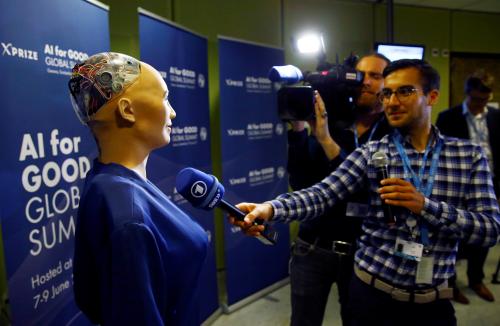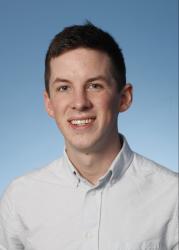This interview is adapted from a segment in the Brookings Cafeteria podcast called “Coffee Break,” where a scholar new to Brookings introduces their background, research interests, and offers book recommendations. The transcript has been slightly edited from the audio recording.
My name is Makada Henry-Nickie, I am a David Rubenstein fellow here at Brookings in the Governance Studies program.
Q: Where did you grow up?
A: I grew up in a couple of different places. I was born  on the sunny island of Trinidad and Tobago, and my seven siblings and I were raised by a single mother who worked hard as a self-employed woman to put a roof over our heads, food on the table, and help us to overcome some significant challenges.
on the sunny island of Trinidad and Tobago, and my seven siblings and I were raised by a single mother who worked hard as a self-employed woman to put a roof over our heads, food on the table, and help us to overcome some significant challenges.
When I was about 16 I sort of had a lucky strike. I was offered the opportunity to move here to the U.S. and so I moved to New Jersey. I spent two years working as a caregiver and a domestic helper in exchange for my community college tuition.
I think that’s where I learned to grow up, which is why I describe myself as growing up in a couple of different places. Most of my young life was characterized by poor circumstances, those are the sorts of experiences I draw on to help inform my personal and professional choices as well as the kinds of lessons I pass on to my children about hope and hard work.
Q: What inspired you to become a scholar?
A: At Hunter College, at the City University of New York, the Andrew Mellon Fellowship Foundation provided me with my start. They have a unique, wonderful program that is committed to boosting minority representation in the ranks of higher education and that’s how I got my start to scholarship. I feel that their investment really created for me opportunity, real meaningful opportunity, and I used that opportunity, that window, to springboard myself far beyond the circumstances into which I was born.
I was inspired by the impact that transformative opportunity had on my life. It’s that inspiration that continued to sort of direct me towards scholarship; because as a scholar I feel that–particularly here at Brookings—my work can raise awareness for or just draw attention to issues and questions that I think are most relevant to poverty and economic inequality.
Q: What do you think is the most important issue we’re facing today?
A: I think that the most important issue or challenge that we’re facing today is inequitable access to opportunity. When I say inequitable access to opportunity, what I’m referring to is a combination of job quality, neighborhood quality, school quality, and child care quality that I think collectively determine the different kinds of opportunities that children and emerging young adults have access to.
My neighborhood, for example, is a gentrifying one. One street divides us into two different worlds. The kids on my side have deep social networks and deep capital networks to draw upon. But, on the other side of the street—I pass there daily— hundreds of families are steeped in poverty, [and] are neatly contained in this big thick metal fence.
One street and one fence decides two different futures for children who on the outside look very similar. Those are the sort of differences or inequities that worry me. And so for those reasons, I think that inequitable access to opportunity is really a threat to our future security and social cohesion.
Q: What are you working on now?
A: I’m excited to join Dr. Camille Busette to stand up Brookings’s new Race, Prosperity, and Inclusion Initiative. Camille and I are both very committed to reframing this narrative around struggling families in poverty.
I think very few people will argue with me when I say in this country when we talk about poverty certain images and words predominate that discussion: lazy, unambitious, unwilling to work, and black. My work intends to disrupt this narrative by offering data driven analyses to show the exact opposite.
The recent Federal Reserve Report on Economic Well-Being shows that 73 million people are struggling to get by, or just making it. It’s hard for me to believe that 73 million people are all lazy. I’m certain that they are creative, that they work hard to sustain themselves and to create opportunities. So, I would prefer to focus on measuring social networks, social capital, informal work participation, and nonlinear trajectories in addition to income. I think taking that approach will help us to better understand and learn about the kinds of coping strategies that struggling families use…to help sustain themselves, so that we can craft policy solutions around these strategies and amplify them.
I also think that neighborhood context matters. So some of my work will also focus on place-based policies such as credit rationing through redlining. I think access to credit is a very important part of the economic opportunity story.
Q: If you could recommend any book to our listeners what would it be?
A: I’d like to recommend two books. The first book would be “Place, not Race” by Sheryll Cashin. I think that Cashin’s thesis on place-based policies offers us some important considerations that we need to take a step back and really take a hard look at. Her idea that place-based policies have the potential to serve a broader constituent of disadvantaged people. I’m really attracted and intrigued by her boldness to suggest—[and I’m sure she’s taking a lot of heat for this] that race-based policies are probably too restrictive, too under inclusive to really address the kinds of economic and equities that have [us] stuck.
The second book—I’m still impacted by it— is “Evicted” by Matthew Desmond. His graphic illustration of housing instability across different family demographics I think offers, anecdotal, but compelling evidence to support Cashin’s thesis that place-based policies probably offer us some more options to deal with the kind of multi-racial economic disadvantage that we’re seeing today.




Commentary
Meet Makada Henry-Nickie, new David M. Rubenstein Fellow in the Governance Studies Program
November 9, 2017